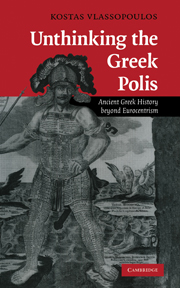Book contents
- Frontmatter
- Contents
- Acknowledgements
- Abbreviations
- Introduction
- PART I DEFINING THE CONTEXTS OF THINKING ABOUT THE POLIS
- 1 An archaeology of discourses
- 2 The ancient discourses on the polis
- 3 Making use of Aristotle: concepts and models
- PART II RETHINKING THE CONTEXTS. THE POLIS AS AN ENTITY: A CRITIQUE
- PART III BEYOND THE POLIS: THE POLIS AS PART OF A SYSTÈME-MONDE
- References
- Index
1 - An archaeology of discourses
Published online by Cambridge University Press: 22 September 2009
- Frontmatter
- Contents
- Acknowledgements
- Abbreviations
- Introduction
- PART I DEFINING THE CONTEXTS OF THINKING ABOUT THE POLIS
- 1 An archaeology of discourses
- 2 The ancient discourses on the polis
- 3 Making use of Aristotle: concepts and models
- PART II RETHINKING THE CONTEXTS. THE POLIS AS AN ENTITY: A CRITIQUE
- PART III BEYOND THE POLIS: THE POLIS AS PART OF A SYSTÈME-MONDE
- References
- Index
Summary
I have chosen the title of this book, Unthinking the Greek polis, to indicate that it is an attempt to look back, question and deconstruct the various discourses that underlie the modern study of the Greek polis. Today the polis is certainly the organising principle of the study of ancient Greek history. Every study of the political, economic, social, cultural and religious life of the ancient Greek world has to engage seriously with this concept. It has come to look as if it is perfectly natural to analyse Greek history within such a framework. But in fact, instead of being the natural, or the most plausible, way of studying Greek history, the polis approach is a relatively recent one, being the product of specific decisions and methodologies within larger discursive arguments.
The Greek word polis has a very ancient pedigree. It is thought to be an Indo-European word denoting the sense of ‘stronghold’. But it is its widespread and all-encompassing use by the ancient Greeks of the first millennium bce that has given it an importance transcending its linguistic meaning. Nevertheless, it is only since the middle of the nineteenth century with the publication of works such as those of Burckhardt and Fustel that the word polis has started to attract the attention of modern scholars, and has become part of Western European discourses and literature.
- Type
- Chapter
- Information
- Unthinking the Greek PolisAncient Greek History beyond Eurocentrism, pp. 13 - 67Publisher: Cambridge University PressPrint publication year: 2007



